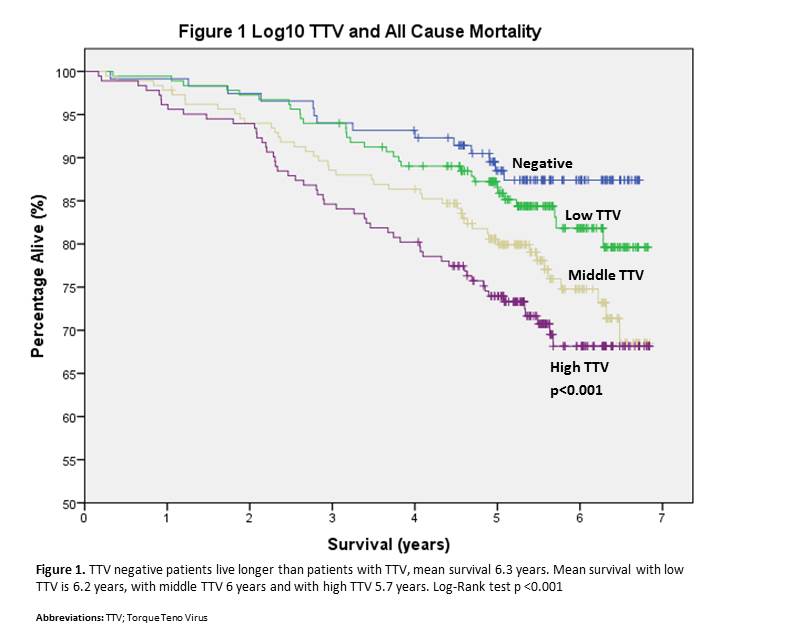A Single Measurement of Torque Teno Virus Helps to Predict Mortality in Renal Transplant Patients
1Department of Medical Microbiology, University Medical Centre Groningen, Groningen, Netherlands, 2Department of Nephrology, University Medical Centre Groningen, Groningen, Netherlands, 3Department of Epidemiology, University Medical Centre Groningen, Groningen, Netherlands, 4Department of Immunology, University Medical Centre Groningen, Groningen, Netherlands
Meeting: 2019 American Transplant Congress
Abstract number: 582
Keywords: Adenoviruses, Graft failure, Kidney transplantation, Mortality
Session Information
Session Name: Concurrent Session: Biomarkers, Immune Monitoring and Outcomes V
Session Type: Concurrent Session
Date: Tuesday, June 4, 2019
Session Time: 4:30pm-6:00pm
 Presentation Time: 5:18pm-5:30pm
Presentation Time: 5:18pm-5:30pm
Location: Room 306
*Purpose: Multiple studies have used longitudinal Torque Teno Virus (TTV) measurements to assess the immune status after transplantation. Longitudinal measurements generally show a TTV load increase initially, before stabilizing 3 to 6 months later. We hypothesised that a single measurement of TTV, taken at least 12 months after transplantation, would reflect the immune status of transplant patients in the long term. Therefore, we investigated the relationship between TTV levels, graft failure, infection episodes and all-cause mortality.
*Methods: 666 participants were recruited from the TransplantLines study. Stored serum was used for the detection of TTV using the R-gene kit (bioMerieux, France). One serum sample per patient, at one time point on average 8 years after transplant (IQR 1- 12 years) was measured. As a control group, 188 potential donors were also tested. Data analyses were performed using SPSS 23.0 for Windows (SPSS Inc., Chicago, IL) and R studio (R Studio Team). Cox regression models were built in a stepwise fashion to avoid over-fitting. Proportionality of hazards for covariates was investigated by inspecting the Schoenfeld residuals. The study protocol was approved by the UMCG institutional review board (METc 2008/186) and adhered to the Declarations of Helsinki and Istanbul.
*Results: 666 renal transplant patients had a mean TTV of 2.54 log copies/mL and 188 potential donors had a mean TTV of 1.14 log copies/mL, a significant reduction compared to patients (p<0.001, Wilcoxon rank test. 18% of patients and 38% of donors were negative for TTV. Renal transplant patients with higher TTV loads (4.78 +/- 0.92 log copies/mL) had significantly higher rates of death per group (p<0.001), high levels of TTV were also found to be predictive of all cause mortality HR 1.19 (95% CI 1.09-1.30) p<0.001 (figure 1). TTV was not predictive of graft failure p=0.565. High levels of TTV were also predictive of death due to infection HR 1.26 (95%CI 1.07-1.48) p = 0.001.
*Conclusions: This study shows that a levels of TTV, tested at least 12 months after transplantation, may be useful in predicting outcome after renal transplantation.
To cite this abstract in AMA style:
Gore E, Leer Cvan, Joode Ade, Nolte I, Westra J, Neto AGomes, Niesters HG, Bakker SJ. A Single Measurement of Torque Teno Virus Helps to Predict Mortality in Renal Transplant Patients [abstract]. Am J Transplant. 2019; 19 (suppl 3). https://atcmeetingabstracts.com/abstract/a-single-measurement-of-torque-teno-virus-helps-to-predict-mortality-in-renal-transplant-patients/. Accessed February 19, 2026.« Back to 2019 American Transplant Congress

